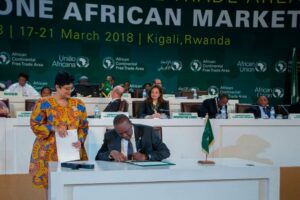
One-stop-shops for Trade Transactions in Driving the Single African Market Agenda
By Musila Muoki
National Single Window Initiatives
The Nigerian Federal government recently launched a National Single Window Project to revolutionize trade and boost Africa’s fourth-largest economy. The initiative, geared toward enhancing revenue generation and import/export trade streamlining, comes at a time when national action is needed among African countries to revolutionize cross-border trade. Nigeria joins other countries, among them Kenya, Cameroon, Ghana, Rwanda, and Senegal among others that have implemented diverse aspects of the Single Window across the continent.
African trade faces multifaceted obstacles, with importers and exporters dealing with a complex web of government agencies across the continent, each with unique requirements and procedures. Paper-based documentation, bureaucratic hurdles, and limited transparency lead to delays, high costs, and lost opportunities. This disproportionally impacts small and medium-sized enterprises that back the African economies and leads to significant revenue loss.
The African Continental Free Trade Area (AfCFTA), considered a game-changer for African economies, promises a unified market of 1.3 billion people and a combined GDP of $3.4 trillion. Existing inefficacies in cross-border trade and a lack of robust trading infrastructure have significantly inhibited this dream. National Single Windows (NSWs) stands as a critical pillar in this endeavor, streamlining trade processes and unlocking the true potential of AfCFTA.
Single Window Solutions

The recently launched National Single Window Project in Nigeria has been characterized as a catalyst for achieving an annual GDP growth rate of 7%. This is by helping save time, creating opportunities in trade, and enabling small businesses to access global markets. Existing inefficiencies cost Nigerian ports an estimated annual loss of $4 billion due to revenue leakages. In addition to the recovered resources being directed towards societal development as per the NSM aspirations, $2.7 billion is expected from paperless trade annually in economic benefit.
The National single window initiatives are a one-stop-shop for trade transactions, allowing the electronic integration of various government agencies involved in cross-border trade into one platform. As a prerequisite for seamless trade across the continent, the single platform can enhance efficiency with businesses easily and quickly submitting trade documents, paying fees, and tracking shipments online. With the continued adoption of the initiative, more AfCFTA members can realize less duplication, reduce processing times, and lower business costs for traders. Since the initiative’s launch, Kenya has, for instance, recorded annual savings of up to shillings 2 billion for traders, onboarding over 38 government partner agencies and over 16,000 registered users.
“As a prerequisite for seamless trade across the continent, the single platform can enhance efficiency with businesses easily and quickly submitting trade documents, paying fees, and tracking shipments online.”
The initiative is associated with reduced cost advantages resulting from faster clearance times and less time spent on transit, leading to lower storage and demurrage charges for businesses. By adopting the frameworks across countries and trade blocs, increased efficiencies can arise from electronic processes providing real-time visibility into the clearance process, enhancing trust and predictability between nations. This is necessary to drive trust for improved collaboration among AfCFTA members in the stages of actualizing a single market for over 1.3 billion people. With this, businesses can dedicate more resources to growth and innovations previously spent on bureaucratic red tape and post boosted trade volumes. Lower costs and faster turnaround time motivate cross-border trade, stimulating economic activity. Simplified procedures from such initiatives can, therefore, be expected to allow smaller businesses to facilitate trade regionally and across Africa, enhancing a more inclusive growth landscape.
The Engine to Drive a Single African Market
The AfCFTA aims to dismantle trade barriers within Africa, facilitating the movement of goods and services across borders. However, this is based on the availability of efficient trade infrastructure and processes among all member states. The national single window initiatives, as well as within regional blocs, stand as an engine that could drive the success of the AfCFTA.
Ahead of the AfCFTA, single window initiatives could facilitate the standardization of trade procedures across member states, creating a level field for businesses across the continent. Therefore, countries and stakeholders can approach this as a source of efficient trade processes to bridge the gap between developed and developing economies for better regional integration outcomes. Moreover, reduced regional and national disparities can originate from a more streamlined trade environment, positioning Africa as a target destination for foreign direct investment to fuel expected economic growth.
A Transformative Agenda
In the international trade framework under the AfCFTA and numerous regional trade blocs, single-window projects would extend beyond efficiencies in trade. The single electronic platforms enhance a culture of transparency and accountability within government agencies. The data collected through the platforms can power cross-border initiatives with valuable insights on trade patterns, informing more policy decisions and optimizing trade flows. A data-driven approach is much needed to help African nations identify trade areas for regional specialization and build more robust value chains.
However, while Nigeria is joining multiple other nations in embracing the single window initiative, much work remains. Individual nations must, therefore, provide adequate resources for developing and maintaining the initiatives, cutting across skilled personnel and robust IT infrastructure for a seamless implementation. While the need for government collaboration with trade blocs and other nations cannot be overstated, internally, collaboration with the private sector to leverage expertise and accelerate its adoption is necessary. Moreover, Harmonizing the initiatives across member states can create a seamless regional trade environment, maximizing the benefits of AfCFTA and trade blocs.
However, the National Single Window initiatives are not a magic bullet but a powerful tool for unlocking Africa’s economic potential. By embracing these initiatives, African nations can transform AfCFTA from an ambitious vision into a thriving reality where a continent with streamlined trade processes, empowered businesses, and a unified market is poised for prosperity.
Muoki Musila is an Kenyan based economist. These are the writer’s own opinions and do not necessarily reflect the viewpoints of Liberty Sparks. Do you want to publish in this space? Contact our editors at info@libertysparks.org for further clarification.



